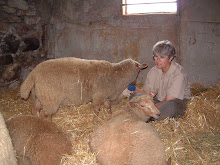Laminitis is one of the most dreaded words to a horse owner. Our 17 year old broodmare, Katee, developed laminitis within weeks of arriving to our farm a little over 10 years ago. It was a painful learning experience for both us and the horse. I knew very little about horses at that point but knew enough to recognize laminitis. Our vet support was poor at best - arrived 12 hours later, administered Banamine and left. No real direction. She developed secondary problems as a result and had chronic hoof problem for years.
Fast forward 10 years. Katee was having inflammation in her hocks making her very uncomfortable and difficult to exercise her to control her blood sugar. Now, we are fairly sure that Katee is insulin resistant and have since her initial attack always been careful with her on pasture. At the suggestion of the vet we had her hocks injected with cortisone. While it helped her hocks, it triggered another bout of laminitis.
Fortunately, 10 years into horse ownership, I know a lot more. Within minutes of realizing she was dead lame, I gave her asprin, put cold compresses around her feet, put frog supports on her feet and got her into deep bedding. With the aid of the vet we got her into thicker pads. She was stall bound for the first few days with constant icing (debatable as to whether that was appropriate). I kept her on Asprin and then Bute for a week, kept her in foot pads. By day 5 we were able to hand walk her comfortably for short stretches gradually increasing the time out.
This morning (day 7) she was out in the grassed round pen for a couple of hours with a grazing muzzle. Inside she is on controlled weight of hay fed in a hockey net bag to slow down her consumption. Plus she has had a couple of longish hand walks. She is wanting to trot and is striding right out.
I am cautiously optimistic about the prognosis but deeply guilty about causing her problems in the first place.
If you have a horse that is insulin resistant or has had a bout of laminitis in the past - Do not use cortisone at all, even joint injections. It really is not worth taking a chance. You might be helping one area but causing yourself and your horse even more grief.
TTFN,
Laurie
Thursday, August 5, 2010
Subscribe to:
Post Comments (Atom)


No comments:
Post a Comment